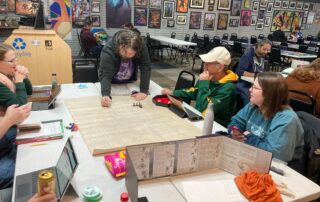Stan Livingston likes to stay in motion. He’s a retired physician who spent two decades running a variety of triathlons, including Madison’s annual Ironman competition.
“I like getting up in the morning and figuring out what exercise I’m going to do that day. It makes me feel better,” Livingston says.
In 2014, Livingston received a diagnosis that altered his life forever.
“I noticed that I had a tremor in my hand,” Livingston said, “(I) went to see the physicians and they confirmed there was Parkinson’s.”
Parkinson’s Disease is a degenerative neurological disorder that deteriorates motor skills, speech and movement. Livingston says some days he still doesn’t believe it.
“There’s a lot of adjustment to realizing that you have a degenerative disease that just by nature’s going to get gradually worse over time,” Livingston said.
Livingston no longer runs triathlons but still exercises daily. One of his favorite activities is Rock Steady Boxing. It’s a weekly non-contact boxing class in Fitchburg for people with Parkinson’s Disease. Fitness trainer Patti Batt runs the class. She says boxing is one of the best ways to combat the effects of Parkinson’s.
“You have to have balance. There’s a lot of balance with boxing. You have to have coordination. You have to have strength,” Batt said.
Each class usually has two components, a section with more traditional cardio and strength exercises plus a section that features a variety of boxing moves with large heavy bags and small speed bags. Batt doesn’t pull punches with the workout.
“They are fighting for their lives. They’re fighting really hard against a disease that really pushes them and challenges them every day, so to come in here, they need to really go at it full force,” Batt said.
Livingston believes the class has helped slow his Parkinson’s symptoms. Just as importantly it makes him feel good and helps him stay positive.
“A lot of times we don’t have a choice of what problems we face, but we do have a choice of how we address them,” Livingston said.
Facing the fight of a lifetime, Livingston plans to go the distance.
“You can still live well with Parkinson’s. That’s basically what we’re all trying to do, to understand the challenges, but still have a full and meaningful life,” Livingston said.







